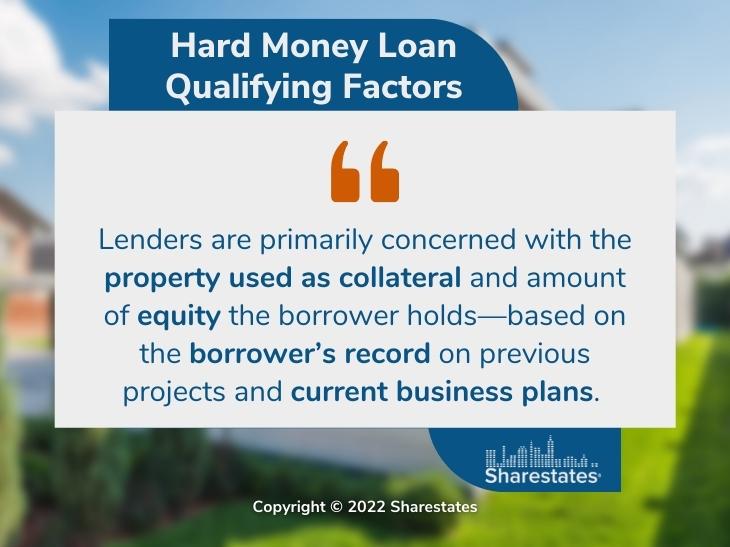What Real Estate Pros Love About Georgia hard money lenders
The Duty of Hard Cash Loans in Property Deals: What You Required to Know
Difficult cash car loans are a crucial financing tool in property transactions. They offer capitalists quick accessibility to resources, especially in urgent scenarios. Guaranteed by real residential property, these financings concentrate on possession value instead than the borrower's credit report background. However, they feature notable threats and prices. Recognizing the nuances of hard cash car loans is important for anyone aiming to navigate this intricate financial landscape properly. What factors should financiers think about prior to continuing?
What Are Tough Cash Finances?
Hard money fundings work as a vital financing option in realty purchases, specifically for capitalists seeking fast access to funding. Unlike typical lendings, hard cash lendings are secured by actual home and are mainly based upon the value of the asset rather than the debtor's credit reliability. These fundings are normally provided by personal lending institutions or capitalists, making it possible for borrowers to bypass prolonged approval processes connected with standard funding.
Hard money fundings are frequently short-term options, with payment periods ranging from a few months to a few years. Due to their expedited nature, they are popular amongst property flippers and those requiring immediate funds for residential property acquisition or rehab. Rates of interest for hard money car loans often tend to be greater than typical fundings, showing the enhanced threat lending institutions embark on. Generally, tough cash lendings satisfy a vital duty in the realty market, satisfying those who require flexibility and rate in their financing options.
Benefits of Hard Cash Loans
While traditional funding can be difficult and sluggish, tough cash fundings offer a number of distinct benefits that appeal to actual estate financiers. One key advantage is the speed of the financing process; financings can often be approved and moneyed within days, enabling financiers to seize possibilities promptly. This rapid turn-around is particularly helpful in competitive markets where time is important.
Furthermore, hard cash financings are mainly asset-based as opposed to credit-based, indicating that investors with less-than-perfect credit can still secure financing. This accessibility makes it possible for a more comprehensive array of investors to participate in real estate transactions.
In addition, hard money lending institutions typically have extra versatile conditions contrasted to standard lenders, permitting personalized payment strategies customized to specific project needs. This adaptability can improve a financier's ability to manage cash flow successfully during restoration or resale stages. On the whole, these benefits make difficult money lendings a compelling selection for many real estate endeavors.
Possible Disadvantages to Think About
While tough cash financings can offer quick financing, potential downsides call for cautious consideration. Debtors frequently encounter greater rate of interest contrasted to typical financing, which can increase overall expenses. In addition, the shorter settlement terms might press debtors to safeguard refinancing or market the residential property faster than prepared for.
Higher Rate Of Interest
Greater rate of interest stand for a considerable factor to consider in tough cash financings, especially in property purchases. These lendings generally include prices that are significantly more than traditional financing alternatives, frequently ranging from 8% to 15%. This raised cost can impact the general earnings of a realty investment, as debtors might find themselves designating a larger portion of their budget to passion repayments. Additionally, the high rates can produce difficulties for investors seeking to take advantage of their capital properly. For those that are not prepared for these economic implications, the burden of high-interest repayments can lead to capital issues, inevitably influencing the success of the residential property financial investment. As a result, recognizing the implications of higher rates of interest is vital for prospective debtors.
Shorter Repayment Terms
Shorter repayment terms are a defining quality of difficult money financings, which can provide various obstacles for consumers. Usually varying from six months to three years, these terms require debtors to pay off the finance promptly, frequently bring about monetary stress. The stress to produce returns within a minimal timeframe can press consumers to rush property remodellings or sales, possibly compromising the top quality of the financial investment. Furthermore, the necessity of a speedy exit method may limit alternatives for refinancing or marketing, resulting in greater risks. Consumers need to very carefully consider their monetary capabilities and market conditions to avoid back-pedaling these car loans, which can bring about the loss of the collateralized residential or commercial property.
How Difficult Cash Loans Work
Hard money fundings run via a special framework that focuses on asset worth over creditworthiness. The approval procedure is typically speedy, permitting customers to accessibility funds rapidly contrasted to conventional funding. Additionally, an evaluation of rate of interest discloses that hard money loans frequently carry higher prices, reflecting the raised threat taken by lenders.
Lending Structure Clarified

In realty purchases, recognizing the framework of hard cash lendings is crucial for investors looking for fast financing. Hard money lendings are normally safeguarded by realty, with the property serving as security. These financings usually include higher passion prices compared to traditional financing, reflecting the enhanced risk taken by lending institutions. The finance terms are normally short, usually varying from 6 months to three years, promoting rapid access to funding. Lending amounts can differ considerably, typically depending on the building's value rather than the debtor's credit reliability. Capitalists profit from the expedited approval process, enabling them to take investment opportunities without delay. Overall, the structure of tough money lendings accommodates those requiring fast, adaptable financing options in genuine estate markets.
Approval Process Overview
The authorization process for hard cash loans stands out from typical financing techniques, primarily concentrating on the security rather than the customer's credit report profile. Lenders review the worth of the building being used more info as security, guaranteeing it satisfies their criteria for danger assessment. When a property is identified, borrowers submit a financing application that consists of information about the property and the intended use funds (Georgia hard money lenders). The lending institution carries out a quick appraisal and might require added documents, yet the process is typically sped up contrasted to conventional loans. Authorization often happens within days, permitting consumers to accessibility funds rapidly. This structured strategy is advantageous genuine estate investors looking for fast funding solutions for procurement or renovation tasks
Rates Of Interest Comparison
While difficult cash finances offer quick accessibility to funds, their rates of interest are typically more than those of typical home mortgages. Customers can expect rates varying from 8% to 15%, relying on the lender and the specifics of the transaction. In comparison, standard mortgage prices usually fall in between 3% and 6%. The greater rates related to hard cash loans reflect the increased danger lending institutions take, as these lendings are commonly secured by the property itself instead than the customer's creditworthiness. This suggests that while tough cash financings can promote quick funding for actual estate financial investments, they can likewise result in substantially greater expenses in time, making it essential for borrowers to thoroughly examine their financial situation before proceeding.
When to Utilize Difficult Money Finances
When is it sensible to contemplate tough cash financings in property transactions? Financiers often consider these financings in situations where typical funding is either not practical or unavailable. For instance, difficult cash financings can be helpful for homes needing fast acquisition, such as repossession public auctions or troubled buildings requiring instant renovations.
Additionally, investor looking for to maximize time-sensitive possibilities, like flipping residences, might locate tough money fundings beneficial because of their expedited approval procedure. Consumers with less-than-perfect credit scores or non-traditional homes may likewise choose for difficult cash financing, as lending institutions primarily concentrate on the residential property's value rather than the borrower's monetary background.
Tips for Selecting a Difficult Cash Lender
Exactly how can investors ensure they choose the right tough money lending institution for their genuine estate demands? First, detailed research study is essential. Capitalists ought to evaluate possible loan providers by assessing their customer, online reputation, and experience testimonies. It is a good idea to choose lenders who specialize in the kind of residential or commercial property being financed, as this can enhance the probability of favorable terms.
Next, understanding the lending institution's problems and terms is considerable. Investors need to inquire regarding passion rates, fees, and repayment timetables. Clear communication is vital; loan providers ought to be ready to make clear any kind of unpredictabilities.
Additionally, assessing the lender's funding speed and versatility can be valuable, particularly in open markets. Financiers must also consider building a rapport with the lending institution, as a good partnership can promote smoother transactions. Finally, seeking advice from sector experts or property agents can give more understandings and referrals, guaranteeing an educated decision.
Regularly Asked Concerns
Can Hard Cash Loans Be Utilized for Business Residences?
Difficult money loans can indeed be made use of for commercial properties, offering fast financing options for capitalists - Georgia hard money lenders. These lendings are generally safeguarded by the building itself, permitting debtors to accessibility funds without standard borrowing needs
What Is the Typical Loan-To-Value Ratio for Hard Cash Loans?
The typical loan-to-value proportion for tough cash finances normally ranges from 60% to 75%. This proportion differs based on the property type, lending institution policies, and specific customer scenarios, reflecting the higher risk related to these fundings.
Are Difficult Cash Fundings Readily Available to Newbie Property Buyers?
Hard cash financings can be easily accessible to first-time property buyers, though terms vary by loan provider. These car loans frequently have higher rate of interest rates and much shorter settlement durations, making them a much less standard choice for brand-new purchasers.
How Promptly Can I Shut on a Hard Cash Loan?
The rate of shutting on a hard money funding can vary, but usually it varies from a few days to a couple of weeks, depending upon the lender's requirements and the borrower's financial circumstance. (Georgia hard money lenders)
What Papers Are Needed to Use for a Hard Cash Funding?

Unlike conventional car loans, hard cash fundings are protected by actual property and are primarily based on the value of the possession rather than the customer's creditworthiness. Interest prices for difficult money car loans tend to be higher than typical fundings, showing the enhanced threat lenders take on. The approval process for hard cash car loans is unique from conventional borrowing methods, mostly focusing on the security rather than the borrower's debt profile. The higher rates connected with tough money financings reflect the raised threat lending institutions take, as these financings are typically protected by the property itself rather than the customer's creditworthiness. To apply for a difficult cash car loan, customers usually need to supply property information, a car loan application, evidence of earnings, debt background, and identification.